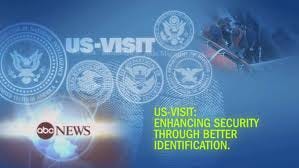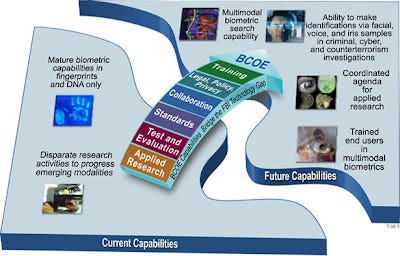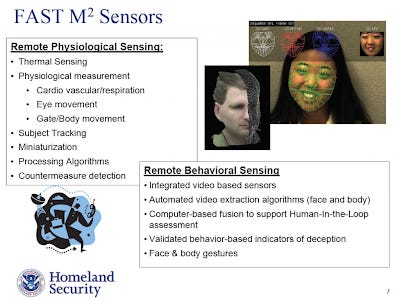DHS wants to create a national biometric database of every American with immigration reform.

The immigration reform measure the Senate began debating yesterday would create a national biometric database of virtually every adult in the U.S., in what privacy groups fear could be the first step to a ubiquitous national identification system.
Buried in the more than 800 pages of the bipartisan legislation (.pdf) is language mandating the creation of the innocuously-named “photo tool,” a massive federal database administered by the Department of Homeland Security and containing names, ages, Social Security numbers and photographs of everyone in the country with a driver’s license or other state-issued photo ID.
Employers would be obliged to look up every new hire in the database to verify that they match their photo.
This piece of the Border Security, Economic Opportunity, and Immigration Modernization Act is aimed at curbing employment of undocumented immigrants. But privacy advocates fear the inevitable mission creep, ending with the proof of self being required at polling places, to rent a house, buy a gun, open a bank account, acquire credit, board a plane or even attend a sporting event or log on the internet. Think of it as a government version of Foursquare, with Big Brother cataloging every check-in.
“It starts to change the relationship between the citizen and state, you do have to get permission to do things,” said Chris Calabrese, a congressional lobbyist with the American Civil Liberties Union.
“More fundamentally, it could be the start of keeping a record of all things.”
David Bier, an analyst with the Competitive Enterprise Institute, agrees with the ACLU’s fears.
“The most worrying aspect is that this creates a principle of permission basically to do certain activities and it can be used to restrict activities,” he said. “It’s like a national ID system without the card.”
http://www.wired.com/threatlevel/2013/05/immigration-reform-dossiers/
http://libertyblitzkrieg.com/2013/05/10/guess-whats-hidden-in-the-immigration-bill-a-national-biometric-database-for-citizens/
http://www.biometricupdate.com/201305/could-u-s-immigration-reform-include-a-national-biometric-database/
http://privacysos.org/node/1057
The disturbing reality of biometrics - The FBI's Biometric Center:

The Biometrics Center of Excellence (BCOE) collaborates with partners and forms beneficial partnerships to leverage capabilities of the wider biometrics community and to expand the FBI’s biometric capabilities. The BCOE has formed important partnerships with various agencies. Clicking on one of the partner links will take you away from the BCOE site. You will then be subject to that particular site’s policies.
The FBI’s Science and Technology Branch created the BCOE — a one-stop shop for biometric collaboration and expertise — to strengthen our ability to combat crime and terrorism with state-of-the-art biometrics technology. The BCOE, which was established to help meet the challenges and opportunities that the widespread use of biometrics represents, is the FBI’s program for advancing the use of new and enhanced biometric capabilities. The BCOE is a collaborative initiative of the Laboratory Division, the Operational Technology Division, the Criminal Justice Information Services Division, and the Special Technologies and Applications Office.
Together, scientists, technicians, and biometrics experts are advancing the BCOE's mission to “foster collaboration, improve information sharing, and advance the adoption of optimal biometric and identity management solutions within the FBI and across the law enforcement and national security communities.”
Protecting the privacy of individuals also plays an important role in our work. The BCOE is committed to the protection of individual privacy rights and civil liberties. Privacy will be treated as an essential component in the planning and implementation of all BCOE-sponsored initiatives.
The BCOE’s services fall into three categories:
Biometrics & Emerging Technologies (Technology Services): The BCOE sponsors targeted applied research and prototyping activities, facilitating the test and evaluation of emerging technologies and systems, incrementally expanding the FBIs Certified Products List, and participating in standards development activities. The BCOE will champion the internal and external development of technology to accelerate the delivery of biometrics and identity management capabilities and to support multimodal system development and system interoperability.
Collaboration & Information Sharing (Relationship Management Services): The BCOE focuses in two areas: 1) building and maintaining key domestic and international relationships needed to bridge the gap between promising biometric research and operational needs and 2) engaging a team of experts to address privacy and other important legal, policy, and procedural issues related to research, standards development, functionality, data management, and deployment of biometric systems.
Enhancing Stakeholder Capabilities (End User Services): The BCOE provides expanded training offerings and certification curriculum to law enforcement and national security partners to prepare for the emergence of new biometric capabilities. The BCOE will also provide hosting and other services (data center, system administration, continuity of operations, and examiner services) for agencies that would benefit from the FBI’s expertise and economies of scale.
http://www.biometriccoe.gov/default.htm
DHS future attribute screening technology mobile module overview:




